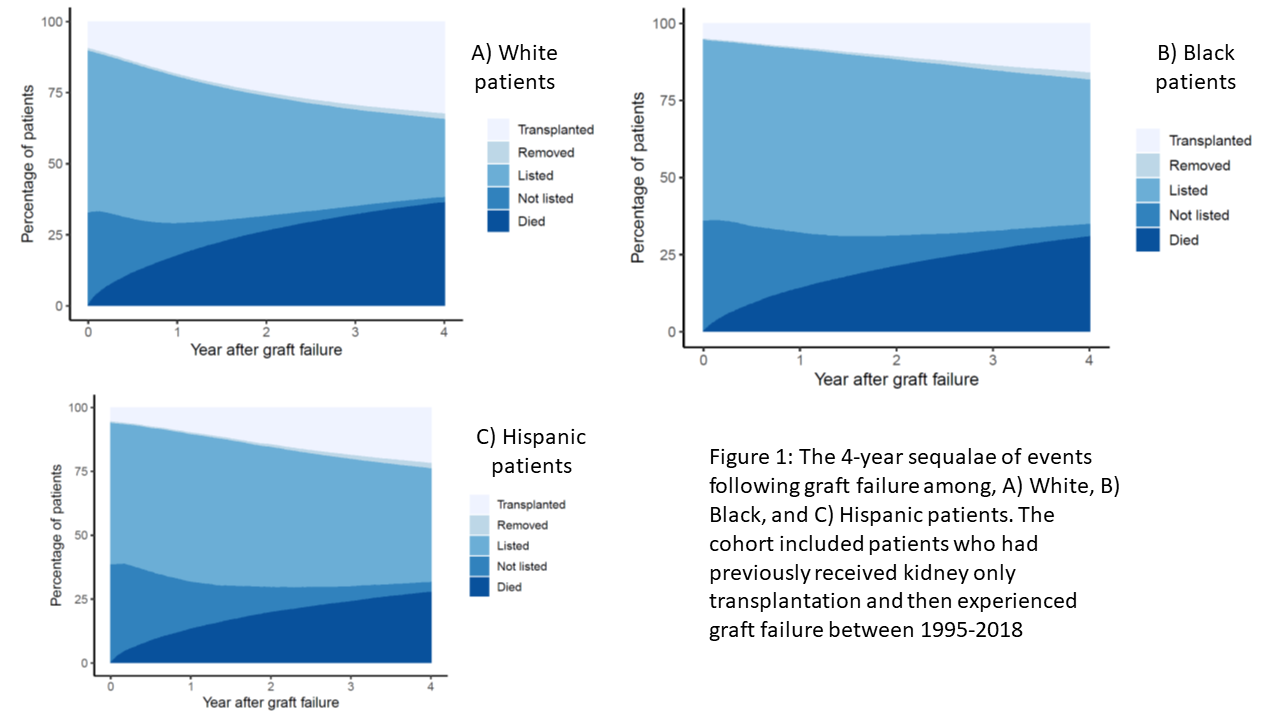Comparing Disparities in Access to First and Re-Kidney Transplantation Among Hispanic and Black Adults in the United States
1McGill University, Montreal, QC, Canada, 2SOM, Johns Hopkins University, Baltimore, MD, 3Johns Hopkins University, Baltimore, MD, 4Johns Hopkins School of Medicine, Baltimore, MD, 5McGill University Health Ctr, Montreal, QC, Canada
Meeting: 2022 American Transplant Congress
Abstract number: 70
Keywords: African-American, Hispanic, Multivariate analysis, Patient education
Topic: Clinical Science » Organ Inclusive » 70 - Non-Organ Specific: Disparities to Outcome and Access to Healthcare
Session Information
Session Name: Disparities to Outcome and Access to Healthcare
Session Type: Rapid Fire Oral Abstract
Date: Sunday, June 5, 2022
Session Time: 3:30pm-5:00pm
 Presentation Time: 3:50pm-4:00pm
Presentation Time: 3:50pm-4:00pm
Location: Hynes Room 311
*Purpose: There are significant racial/ethnic disparities in access to solid organ transplantation; lack of education and familiarity with the transplant process are postulated contributors. Among patients who have received one transplant and later need another one, these barriers are likely mitigated and disparities are attenuated. We aimed to compare the magnitude of racial/ethnic disparities in access to re-kidney transplantation (KT) versus first-KT as the numbers in the graft failure cohort were large enough to arrive at plausible conclusions.
*Methods: This was a national cohort of adult (≥18 years) patients who received a first-KT and experienced graft failure (n=104,454) and a cohort of adult transplant-naïve dialysis patients (n=2,357,753) from 1995-2018. Chances of waitlisting for, and receiving re-KT versus first-KT were compared by race/ethnicity using multivariable Cox regression analysis.
*Results: In the graft failure cohort, a 4-year sequela of events following graft failure is summarized in Figure 1. When compared with White patients, Black and Hispanic patients had lower chances of waitlisting (Black:adjusted hazard ratio [aHR]=0.76, 95%CI:0.74-0.78]; Hispanic:aHR=0.83, 95%CI:0.81-0.85) and receiving re-KT (Black:aHR=0.56, 95%CI:0.54-0.58; Hispanic: aHR=0.73, 95%CI:0.70-0.76). In the transplant-naïve cohort, Black patients also had lower chances of waitlisting (Black:aHR=0.84, 95%CI:0.83-0.84, Hispanic:aHR=1.05, 95%CI:1.05-1.06); both Black and Hispanic patients had a lower chance of receiving first-KT (Black:aHR=0.67, 95%CI:0.66-0.77; Hispanic:aHR=0.70, 95%CI:0.69-0.71). Disparities in access to re-KT were greater amongst Black patients with graft failure than transplant-naïve Black patients accessing first-KT (pinteractions<0.001). For Hispanic patients, disparities in access to waitlisting (pinteraction<0.001) but not re-KT (pinteraction=0.17) were greater.
*Conclusions: Despite better familiarity with the transplant process and healthcare system resulting from the previous transplant, Black and Hispanic patients with graft failure experience disparities in access to re-KT that are worse or similar to disparities in accessing first-KT. This indicates that inherent systemic and structural factors likely play a major role towards inequitable access in transplantation.
To cite this abstract in AMA style:
Sandal S, Ahn J, Thompson V, Purnell T, Cantarovich M, Segev D, DeMarco MMcAdams. Comparing Disparities in Access to First and Re-Kidney Transplantation Among Hispanic and Black Adults in the United States [abstract]. Am J Transplant. 2022; 22 (suppl 3). https://atcmeetingabstracts.com/abstract/comparing-disparities-in-access-to-first-and-re-kidney-transplantation-among-hispanic-and-black-adults-in-the-united-states/. Accessed February 17, 2026.« Back to 2022 American Transplant Congress

